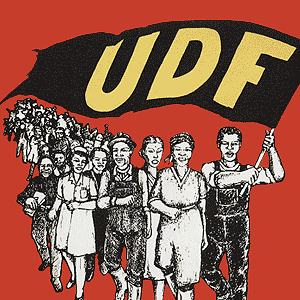
United Democratic Front (South Africa)
The United Democratic Front (UDF) was a South African popular front that existed from 1983 to 1991. The UDF comprised more than 400 public organizations including trade unions, students' unions, women's and parachurch organizations. The UDF's goal was to establish a "non-racial, united South Africa in which segregation is abolished and in which society is freed from institutional and systematic racism."[1] Its slogan was "UDF Unites, Apartheid Divides." The Front was established in 1983 to oppose the introduction of the Tricameral Parliament by the white-dominated National Party government, and dissolved in 1991 during the early stages of the transition to democracy.
Not to be confused with United Democratic Movement.Background[edit]
Involvement in trade unions, beginning in Durban in 1973, helped create a strong, democratic political culture for black people in South Africa.[2] Mass urban protest could also be traced to the student upsurge in Soweto in 1976.[3]
1982 brought the effects of a world economic crisis to South Africa, and the price of gold fell in 1985.[3] The result of these things and other economic problems caused mass unemployment, especially for young black South Africans.[3]
The apartheid state wrote a new constitution in 1983 "in an attempt to allay criticism against apartheid and to set a new course."[4] The new form of government created a Tricameral Parliament which allowed Coloured and Asian South Africans "nominal representation."[5] Black people were still not allowed to participate in the government.[4][5]
During a demonstration in Langa in 1984, police shot the participants which led to further insurrection.[6] This led to a "black youth uprising" by 1985 in South Africa.[6]
Online Archives